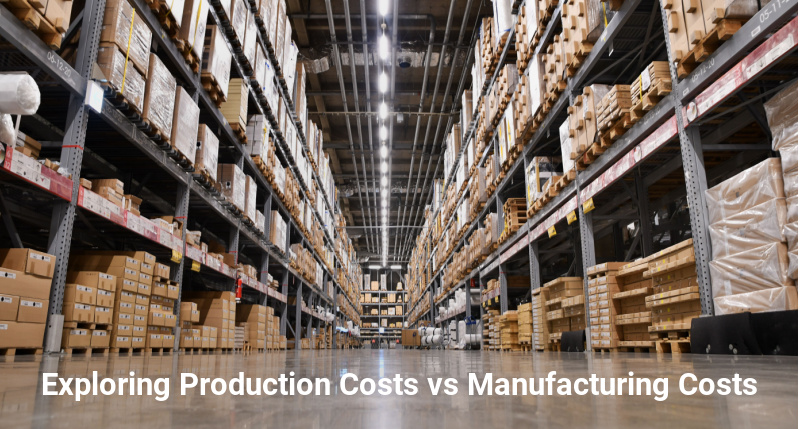Production costs vs. manufacturing costs: what’s the difference, and why do they matter?
It’s a great question for accountants working towards providing manufacturing companies with indispensable services because the truth is, these cost numbers can tell you a lot about your client’s business.
Let’s jump right in.
What are Production Costs?
Production costs are the expenses a company generates throughout the entire process of creating and distributing a product or service.
While production costs vary based on the industry and product being produced, there are a few common elements across the board:
- Raw materials
- Labor
- Overhead
- Equipment and machinery
- Research and development
- Transportation and logistics
Notice that production costs include both variable and fixed costs. By understanding and managing production costs, companies can optimize their:
- Efficiency
- Pricing strategies
- Overall profitability
What Factors Influence Production Costs?
Because production costs encompass the entire process of creating and distributing a product or service, there are a variety of factors that impact them. Some of these factors include:
- Economies of scale
- Input costs
- Labor costs
- Tech and automation
- Energy costs
- Compliance
- Location
- Production methods and efficiency
- Currency fluctuations
Let’s dive a little deeper into some of the more impactful factors.
Economies of Scale
In many cases, as production costs decrease, the volume of production increases. This is known as the economies of scale. With larger productions quantities, companies can:
- Use their resources better
- Increase efficiency
- Potentially save on raw materials, labor, and overhead expenses
Input Costs
The price and availability of raw materials, components, and other inputs needed for production have a significant impact on production costs.
For example, if a company requires a specific type of plastic to produce the product, but the cost of the plastic has doubled compared to last year, the company's production costs will be impacted.
Production Methods and Efficiency
The efficiency of production methods can greatly affect the production costs. To optimize these, companies can:
- Streamline production planning and scheduling
- Reduce waste
- Improve quality control
- Implement lean manufacturing principles
Paying close attention to these influential factors will help you control production costs, improve competitiveness, and maximize profitability.
What are Manufacturing Costs?
Unlike production costs, manufacturing costs only focus on the costs associated with the production phase. For most companies, this includes:
- Direct materials
- Direct labor
- Manufacturing overhead
Each of these costs focuses on the direct costs involved in converting raw materials into finished goods. It’s important to note that manufacturing costs do not include non-productions costs like research and development expenses, marketing costs, sales commissions, administrative costs, or distribution costs. Instead, these would fall into the category of indirect costs.
By understanding and managing manufacturing costs, companies can:
- Evaluate the efficiency of production processes
- Set product prices
- Determine profitability
- Identify areas for cost optimization
What Factors Influence Manufacturing Costs?
There are several factors that influence manufacturing costs, and they can vary based on industry, production methods, scale of operations, and location. Some of the factors include:
- Product design
- Production volume
- Manufacturing processes and technology
- Labor costs
- Raw materials and components
- Energy costs
- Equipment and machinery
- Location and logistics
- Quality control
- Regulatory compliance
Let’s take a closer look at some of the more impactful factors.
Product Design
The complexity and design of a product can significantly impact manufacturing costs. some of these influences include:
- Intricate designs
- Specialized features
- Complex assembly processes
Production Volume
The production volume can be impacted through economies of scale (which we explained previously).
In many cases, higher production volumes lead to lower per-unit costs as fixed costs are spread out over a larger number of units. Inversely, lower production volumes can result in higher per-unit costs due to reduced efficiency and economies of scale.
Raw Materials and Components
The cost and availability of raw materials and components required for manufacturing directly impact manufacturing costs. This happens when there are:
- Fluctuations in commodity prices
- Supply chain disruptions
- Quality considerations
When you pay close attention to these influential factors, you can identify opportunities for cost reduction and operational improvement.
Why is it Important to Manage and Analyze Production Costs and Manufacturing Costs?
Throughout the article, we’ve mentioned some of the reasons why it’s important to analyze production costs and manufacturing costs, but it’s important we dive a little deeper to help you understand exactly how these numbers can impact the companies you are working with.
- Cost Control
- Knowing these costs helps you identify drivers and areas of inefficiency, which then allows you to implement strategies to reduce costs. And as you know, reduced costs, in many cases, lead to improved profitability.
- Pricing Decisions
- Understanding the cost structure will help companies determine the minimum price required to cover costs and achieve good profit margins. It also ensures the company is setting competitive prices within the industry.
- Financial Planning and Budgeting
- Good cost management requires good financial planning and budgeting. Understanding these costs will allow you to help the companies you serve develop realistic budgets, allocate resources appropriately, and forecast future performance.
The list of reasons goes on, but the bottom line is you need accurate production and manufacturing cost numbers to help your clients make strategic decisions that move their company forward.
.png?width=150&height=63&name=TWRlogo-regmark_blueblack%20(1).png)
.png)










Do you have questions about this article? Email us and let us know > info@woodard.com
Comments: